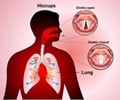Nighttime acid reflux, along with atypical symptoms of Gastro Esophageal Reflux Disease (GERD), is associated with significant sleep impairment, a new study has found. The survey-based study, led by Bonnie Dean, MPH, PhD, of Cerner LifeSciences and Ronnie Fass, MD of the University of Arizona, examined the prevalence of sleep impairment among people with and without GERD.
The atypical manifestations or symptoms of GERD are coughing, sore throat, snoring, wheezing, choking, and chest pain. Total of 701 respondents were identified with GERD, using a validated GERD screening tool and the remaining were controls.The analysis of the study found that sleep impairment was more common among people with GERD, a 41.9 percent, than those without GERD, a 19.4 percent. It was also found that 49.5 percent of respondents with nighttime GERD reported poor sleep often or most of the time, compared to 36.7 percent of people with daytime GERD.
Researchers also assessed sleep impairment among patients experiencing frequent nighttime atypical manifestations of GERD. Of all the GERD patients, 74 percent had at least one nighttime atypical manifestation. For almost every daytime and nighttime atypical manifestation assessed, more than 20 percent of GERD patients reported their occurrence as frequent, i.e. more than 2 days or nights per week.
The study also found that sleep impairment was more common among GERD patients with atypical manifestations compared to GERD patients with only typical or classic symptoms such as heartburn and acid regurgitation. For eight of the nine nighttime atypical manifestations assessed, the GERD cases reported higher sleep impairment as compared to GERD cases with the atypical manifestation compared with GERD cases without the atypical manifestation.
Dr. Dean said that the finding might help aware people about the various options they could take for treating the problem. “Awareness of nighttime reflux, atypical manifestations, and associated sleep complaints should allow more complete evaluation and treatment of GERD patients,” Dr. Dean said.
Heartburn and other GERD symptoms experienced during the night causes sleep disturbances, including arousal from sleep, increased wakefulness and overall poor sleep quality. Several tips to reduce nighttime acid reflux, in order to get some sleep are--sleeping with elevated head and shoulders, wearing loose-fitting clothes, sleeping after 2 to 3 hours after having food, avoiding foods that trigger heartburn.
Advertisement
LIN/V











